
11 minute read
RIB RANCH BBQ (PG
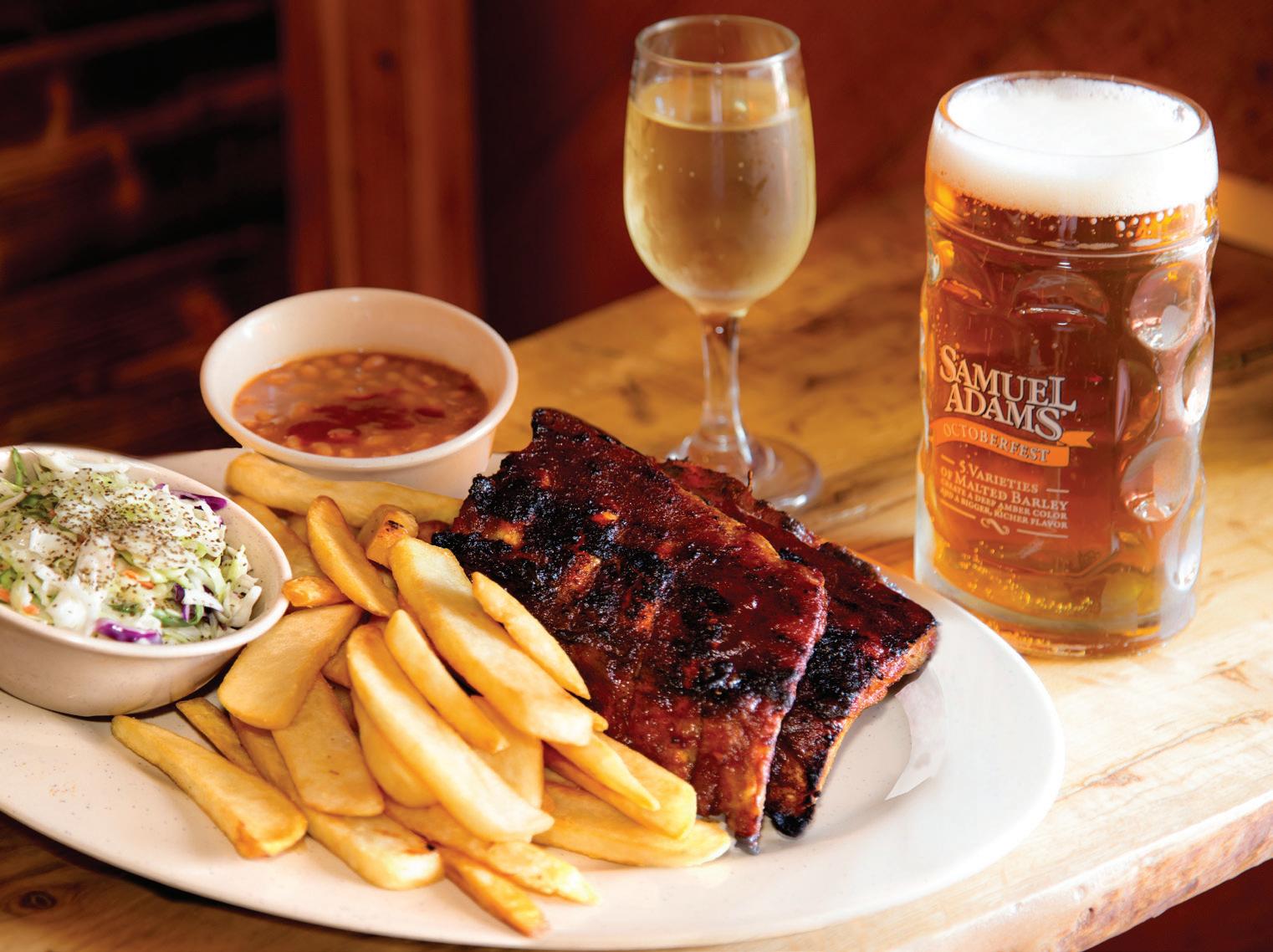

A Local Tradition Since 1970, Our Family’s Special BBQ Recipe is Legendary. INDOOR FIRESIDE OR PATIO DINING CATERING LARGE PARTIES A Local Tradition Since 1970, Our Family’s Special BBQ Recipe is Legendary. INDOOR FIRESIDE OR PATIO DINING CATERING LARGE PARTIES FAMILY OWNED FOR 50 YEARS, WE ARE HERE FOR YOU NOW MORE THAN EVER. A Local Tradition Since 1970, Our Family’s Special BBQ Recipe is Legendary. INDOOR FIRESIDE OR PATIO DINING CATERING LARGE PARTIES A Local Tradition Since 1970, Our Family’s Special BBQ Recipe is Legendary. INDOOR FIRESIDE OR PATIO DINING CATERING LARGE PARTIES FAMILY OWNED FOR 50 YEARS, WE ARE HERE FOR YOU NOW MORE THAN EVER.
HAPPY TO BRING IT HAPPY TO BRING IT ON OVER! ON OVER!



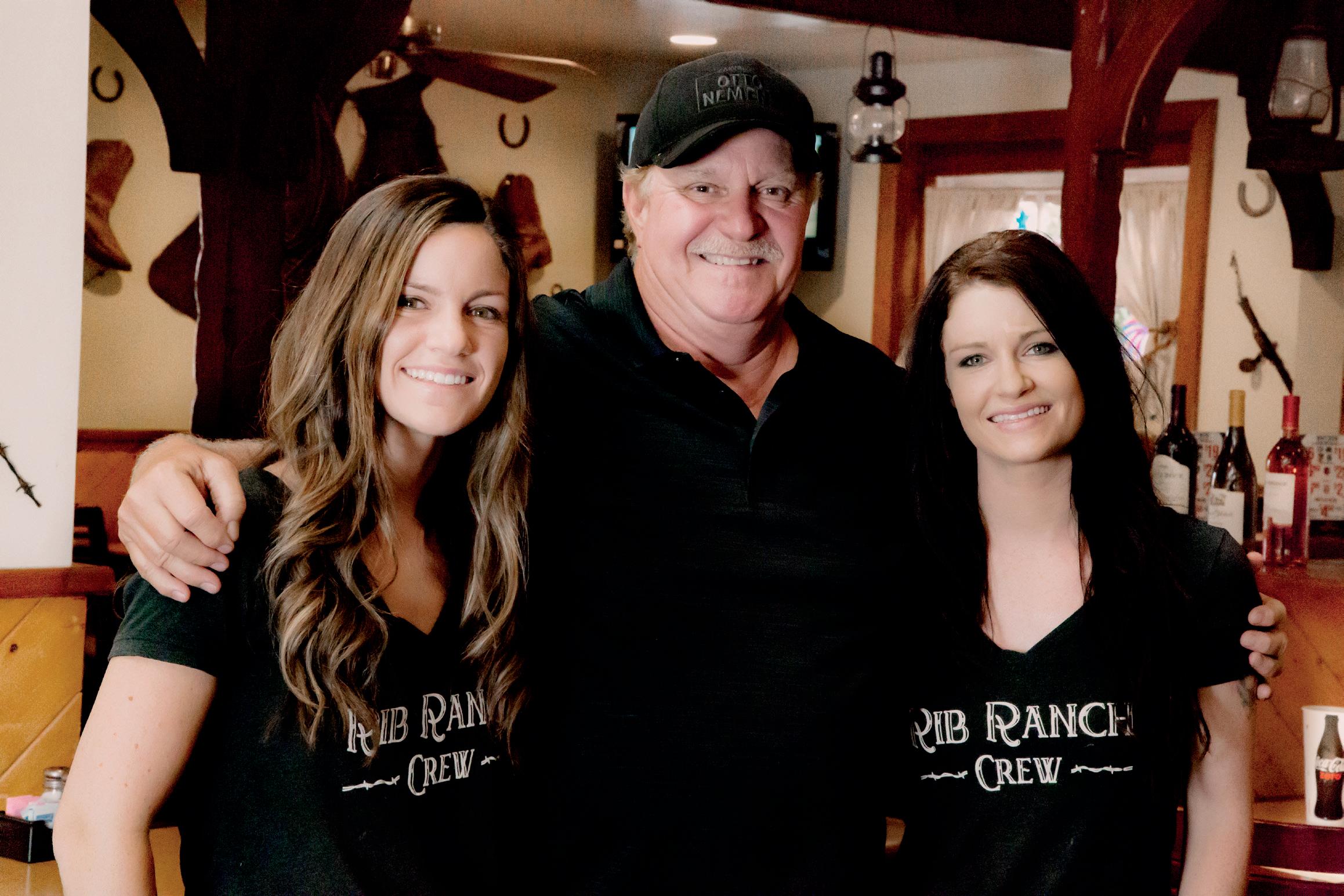
HIDDEN HILLS NAMESAKES John Fremont Road
THE WORD ON THE STREETS
John Fremont Road is revealed as one rounds the northwest loop of Jed Smith Road. Its small size does not compare to the grand historical legacy of John Charles Frémont, the American mapmaker, explorer, military officer, and politician for which it is named. He was an influential figure in the conquest and development of California, in addition to being a U.S. Senator, founder of the California Republican Party, and the first Republican nominee for president of the United States.
Born out of wedlock in 1813, John Fremont grew up a proud & rebellious loner, an early anti-slavery opponent despite being born in Savannah, Georgia. His family settled in Charleston, South Carolina after the premature death of his father. He joined the navy, retiring in 1833 after being appointed second lieutenant in the United States Topographical Corps. Surveying for the Charleston, Louisville, and Cincinnati Railroad in the Carolina mountains activated his desire to explore, which escalated as he reached Georgia around 1837. Fremont became a first rate topographer, trained in astronomy, geology, fauna, flora, soil, and water resources after assisting French explorer and scientist Joseph Nicollet in mapping the upper Mississippi and Missouri rivers.
Fremont’s taste for exploration was influenced by the enthusiasm for expansionism by Missouri Senator Thomas Hart Benton, who became his advisor, sponsor, and father in law in 1841. Senator Benton was the powerful chairman of the Senate Committee on Military Affairs and a Democratic Party leader for more than 30 years who championed the expansionist movement, a political cause known as Manifest Destiny. This crusade was based on a cultural belief that American settlers were destined to expand across the entire North American continent. Benton pushed appropriations through Congress for national surveys of the Oregon Trail, the Oregon Country, the Great Basin, and Sierra Nevada Mountains to California.
Benton’s influence enabled Fremont to accomplish the mapping of much of the territory between the Mississippi Valley and the Pacific Ocean within the next few years on five different expeditions. The first expedition began in 1842 after the War Department assigned him to the area west to Wyoming. In 1843, he completed a survey accompanied by the legendary Joseph Walker, with the colorful guide Kit Carson and mountain man Thomas Fitzpatrick. After thoroughly exploring much of the Northwest, he made the infamous difficult winter crossing of the Sierra Nevada to California, afterwhich suggesting the route be named Walker Pass.
For ten years, Fremont spent his time exploring the country between the Missouri River, the Rocky Mountains, and the Pacific Coast. War with Mexico over the annexation of Texas was imminent, and in the spring of 1845 he headed to California defying Mexican authorities and throwing his support behind a small group of dissidents near Sonoma who started an unofficial uprising and created the Bear Flag Republic.
When news of war with Mexico reached California in May 1946, Commodore Robert F. Stockton appointed Fremont to Major and assembled his party into military service as the “Naval Battalion of Mounted Volunteer Riflemen.” General Stephen Watts Kearny entered California from the southeast with orders to establish a government, leading to a conflict of authority. The dispute between Stockton and Kearny was worked out and together they stopped the Los Angeles uprising when Fremont accepted General Andres Pico’s surrender in the Cahuenga Pass. Signing the Treaty of Cahuenga led indirectly to California’s independence from Mexico by ending rival hostilities and the Mexican American War.
On January 16, 1847, Commodore Stockton appointed Fremont military governor of California. He functioned for a short time without controversy, but was arrested and
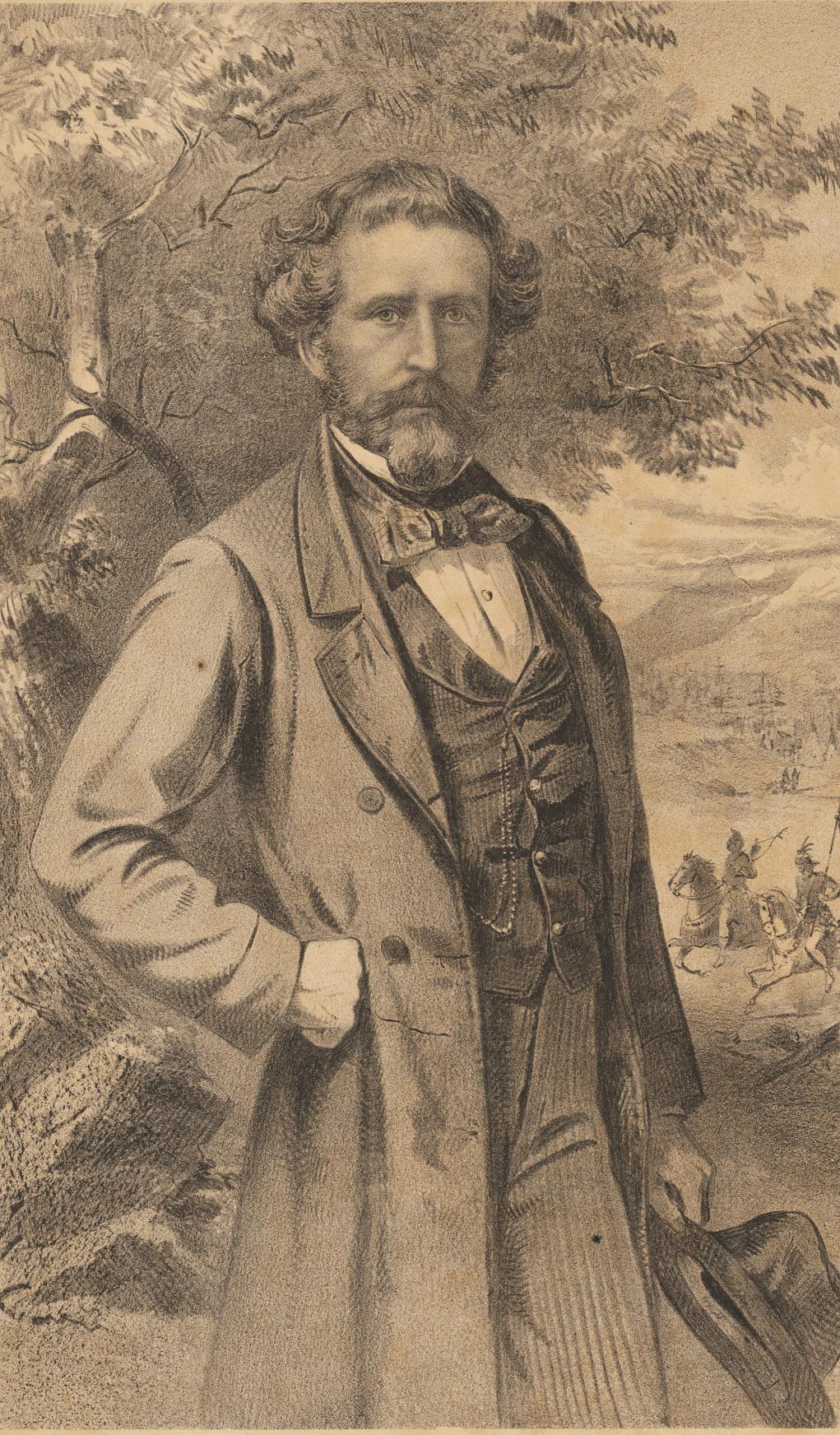
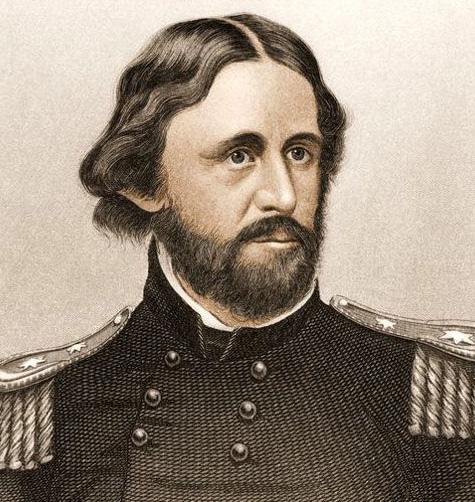
JOHN CHARLES FREMONT
court-martialed within one year by Kearny for disobedience. When he was sentenced to dismissal from the army, he resigned his commission in protest after gaining only a partial pardon from President James K. Polk.
Fremont became a multimillionaire after gold was discovered on Las Mariposas, the seventy square miles of land in the Sierra foothills near Yosemite that he purchased from Juan Bautista Alvarado, the former California governor, for $3,000. Popular among the public, Fremont pivoted into politics and in 1850 was elected one of the state’s first two senators running in firm opposition to slavery. Democratic pro-slavery opponents strongly opposed him and he was not re-elected.
In the fall of 1853, Fremont embarked on his fifth expedition to identify a course for a transcontinental railroad from Missouri arriving in San Francisco following a severe winter optimistic of viable passage through the Rocky Mountains. Seeking a united front and a fresh face, the first Republican National Convention nominated him for the presidency in 1856. Although defeated by the Democratic candidate James Buchanan in the election, he came closer to uniting the electorate of the North and West against the South than any previous candidate.
President Abraham Lincoln appointed Fremont Union Army Major General at the outbreak of the Civil War but dismissed him years later after reports of misconduct as commander in Missouri. Still popular, he was considered for the presidential nomination again in 1864 but withdrew to avoid dividing the Republican Party into two factions: the anti-Lincoln Radical Republicans, who nominated him, and the pro-Lincoln Republicans.
Fremont retired from public life to devote himself to the railroad industry. After losing his fortune in the Panic of 1873, he was appointed governor of the Arizona Territory by President Rutherford B. Hayes. He spent little time in Arizona, and was asked to resume duties in person or resign; he chose resignation. Destitute until he was reappointed as a retired Army Major General, an action that gave him a pension. He spent his remaining days in Staten Island, New York, passing away on July 13, 1890.
John Charles Frémont was known as “the Pathfinder of the West” for his years of topographical service, for expanding settlement across the continent, and for his immense contributions to the creation of the 31st state of California. His publications gave many their first knowledge of the country and made settlement in the West accessible for many Americans. He coined the phrase “Golden Gate” for the strait between Marin County and San Francisco County and is remembered for planting the American flag on the Rocky Mountains during his first expedition, symbolically claiming the West and solidifying his belief in Unionism.
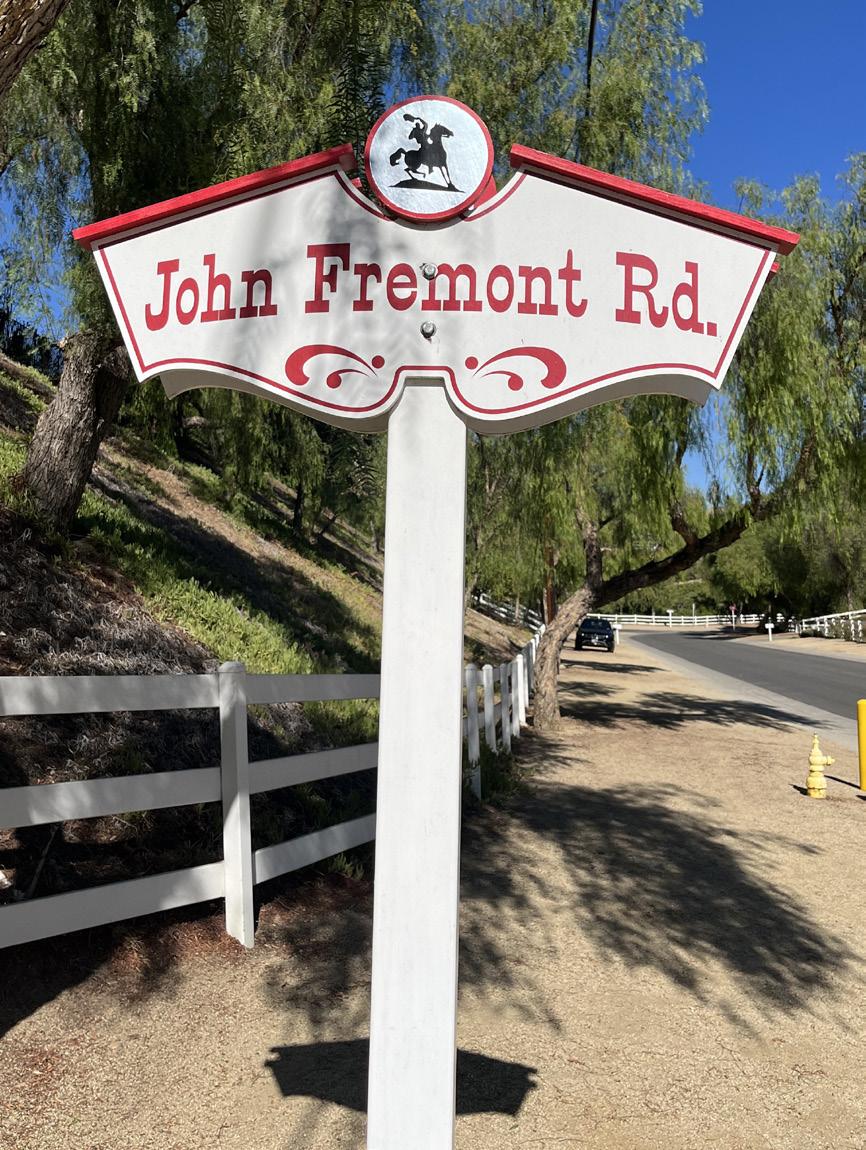
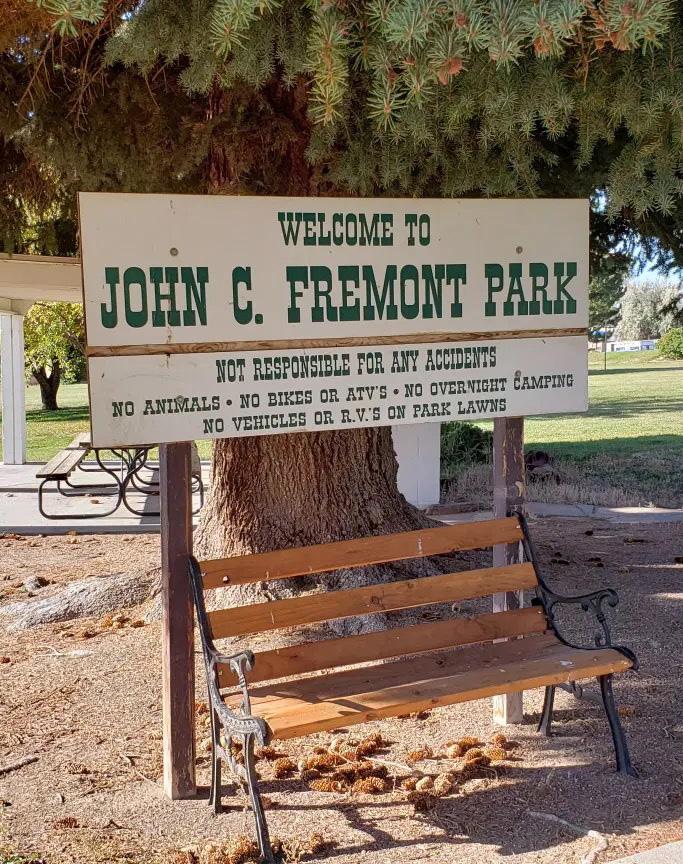
Artsy Oasis AUTOCAMP
JOSHUA TREE, CA
By Elyse Glickman
At AutoCamp Joshua Tree, 38 miles outside of Palm Springs and a three-hour drive from L.A., the great outdoors is cooler and more inclusive than ever. The interior design and layout puts travelers front and center in the midst of the Coachella Valley’s natural wonders while providing creature comforts associated with better hotels. While the premises taps into the glamping phenomenon, it’s also an inclusive affair where newborns, kids, teens, grandparents, and family dogs are welcome as trendsetting young adults.
Lodgings at AutoCamp Joshua Tree for two are neatly arranged in gleaming Airstream trailers that feel much larger when one steps inside. The same holds true for a handful of “Vista X Suites,” slightly scaled up to accommodate three adults or a family of four. A lot of style and function are packed into each Airstream. Playful design elements include 1970s-inspired wall accents, contemporary dark hardwood plank flooring in the main room, and geometric tiles in the bathroom. The shower in each unit is surprisingly roomy, and outfitted with unisex Ursa Major skincare amenities and brushed black metal hardware. The compact bedroom is airy and cozy, and elevated with earthy, soft bed linens. Streamlined storage areas hold such essentials as towels, two plush bathrobes, and other useful supplies, but also easily accommodate clothing and small sports gear brought from the outside.
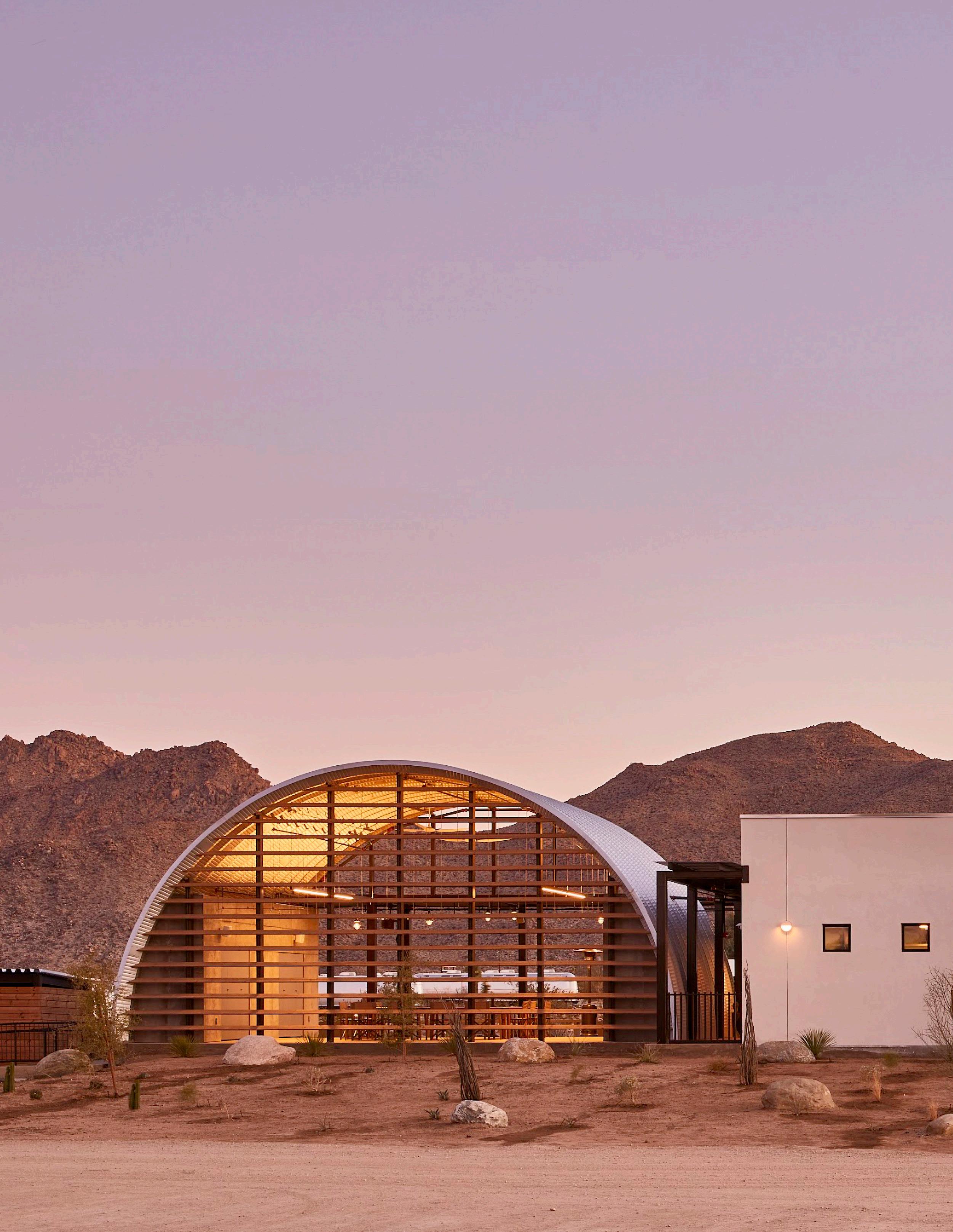
This bold, modern structure is the hub of this ultimate base camp for campters of all ages, physical abilities, tastes and interests.

The kitchenette adjoining the living area is immaculately appointed with a small refrigerator, microwave oven and cabinets with plates, glasses, cookware and barbecue supplies as well as a barbecue grill and mini-patio immediately outside their trailer door. French press coffee, artisanal teas from local producers are available for an additional fee. There’s also complementary wifi available, though the views and the attentive and knowledgeable staff will remind you that it’s probably best to unplug to take full advantage of the surroundings.
Inside the main “tree clubhouse,” which resembles an airport hangar, one can easily access the check-in and concierge desks, lounge seating, and a large retail space. In addition to necessities for hikes and other outdoor pursuits, the shop offers an eclectic selection of goods ranging from AutoCamp Joshua Tree souvenir tees and hoodies for the whole family to educational toys, books, sunglasses, and bottle shop provisions from regional wineries, breweries, and soft-drink makers. Fresh coffee, tea, and granola is set out every morning free of charge to all guests, and there’s a hearty menu of baked goods and full-sized meals as well as lunch and dinner fare offered later in the day from a local caterer. There are also outdoor seating areas, a bar area and lounge areas that can be specially outfitted for special family gatherings or corporate retreats.
On-property activities include a fire pit sitting area (perfect for s’mores, with kits available for sale in the shop), pool, complimentary bikes, and a cornhole court. There are also free yoga classes staged on some mornings, as well as live music nights from time to time. The concierge service offers special activities and custom tours for guests to discover the larger area protected by The Mojave Desert Land Trust, an accredited non-profit organization dedicated to the conservation of 100,000 acres of prime desert habitat that weave through national parks, national monuments, wilderness areas, and wildlife linkage corridors.
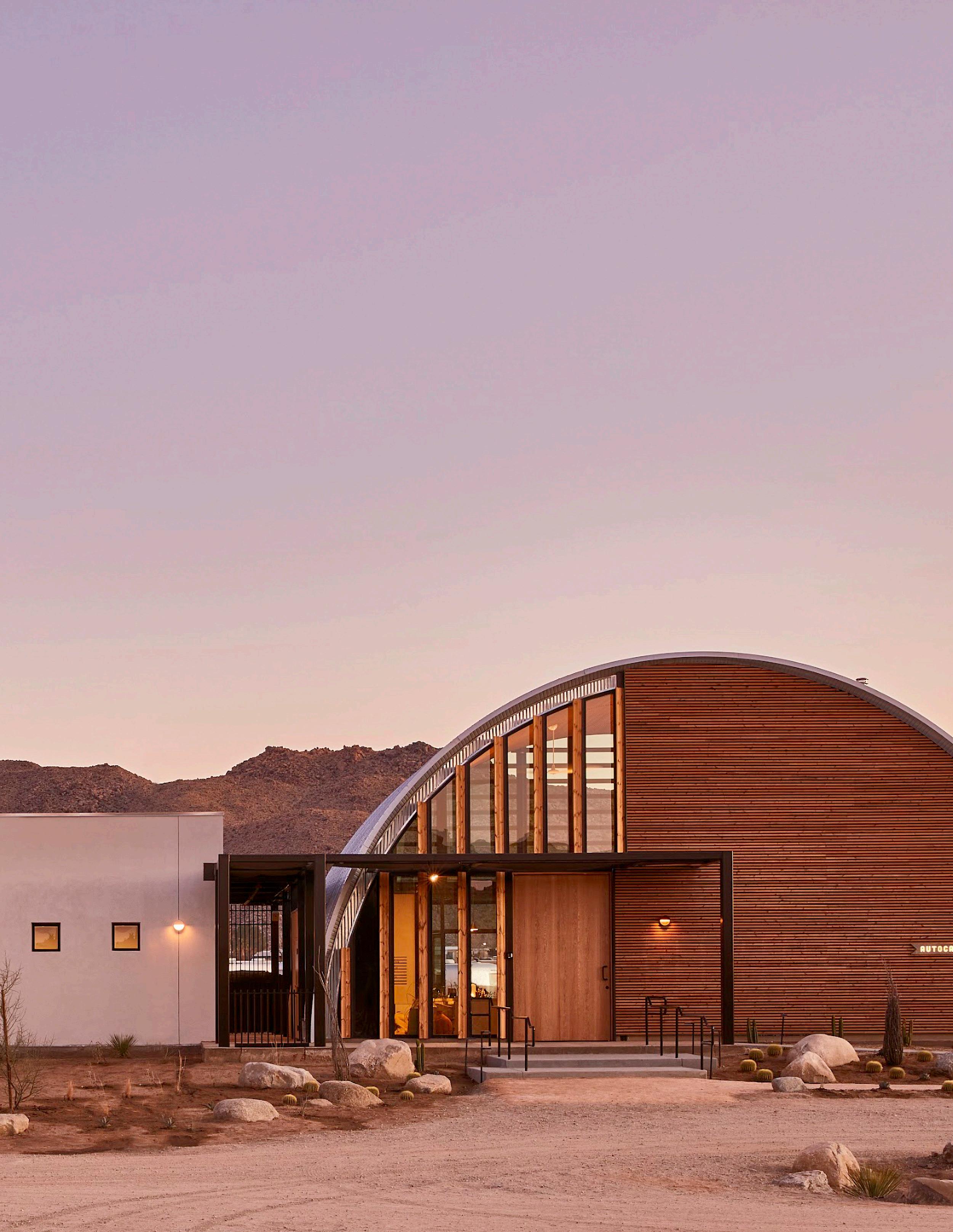
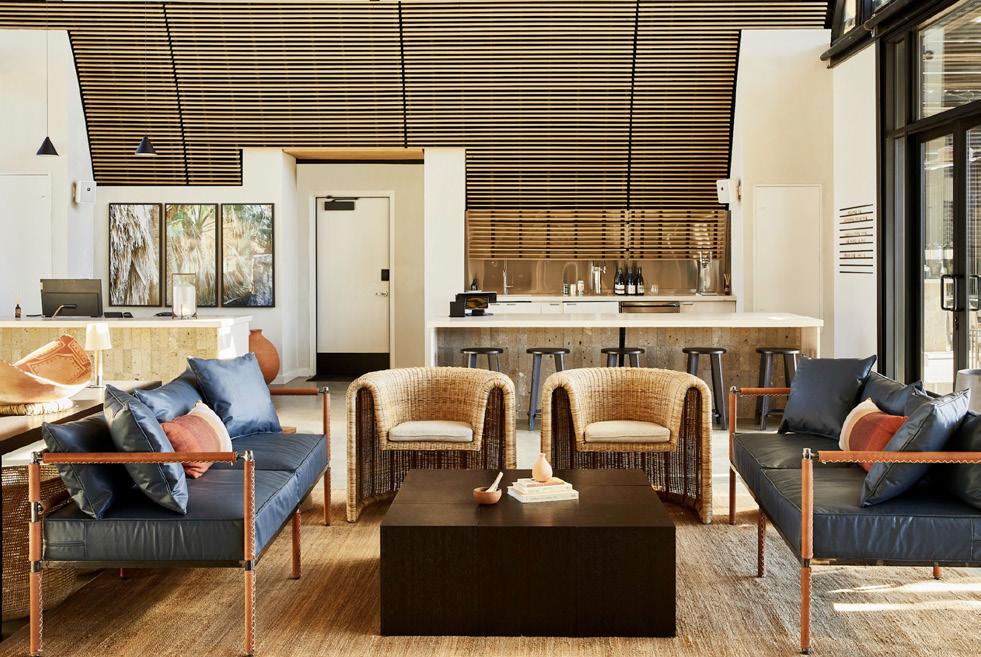
In addition to a panoramic view of AutoCamp’s fleet of Airstream trailers, there are different outdoor seating arrangements along its clubhouse patio where one can enjoy simple and hearty meals provided by local kitchens.
Areas just beyond the patio can be adapted for business groups and large family events. All photographs courtesy of Autocamp Joshua Tree
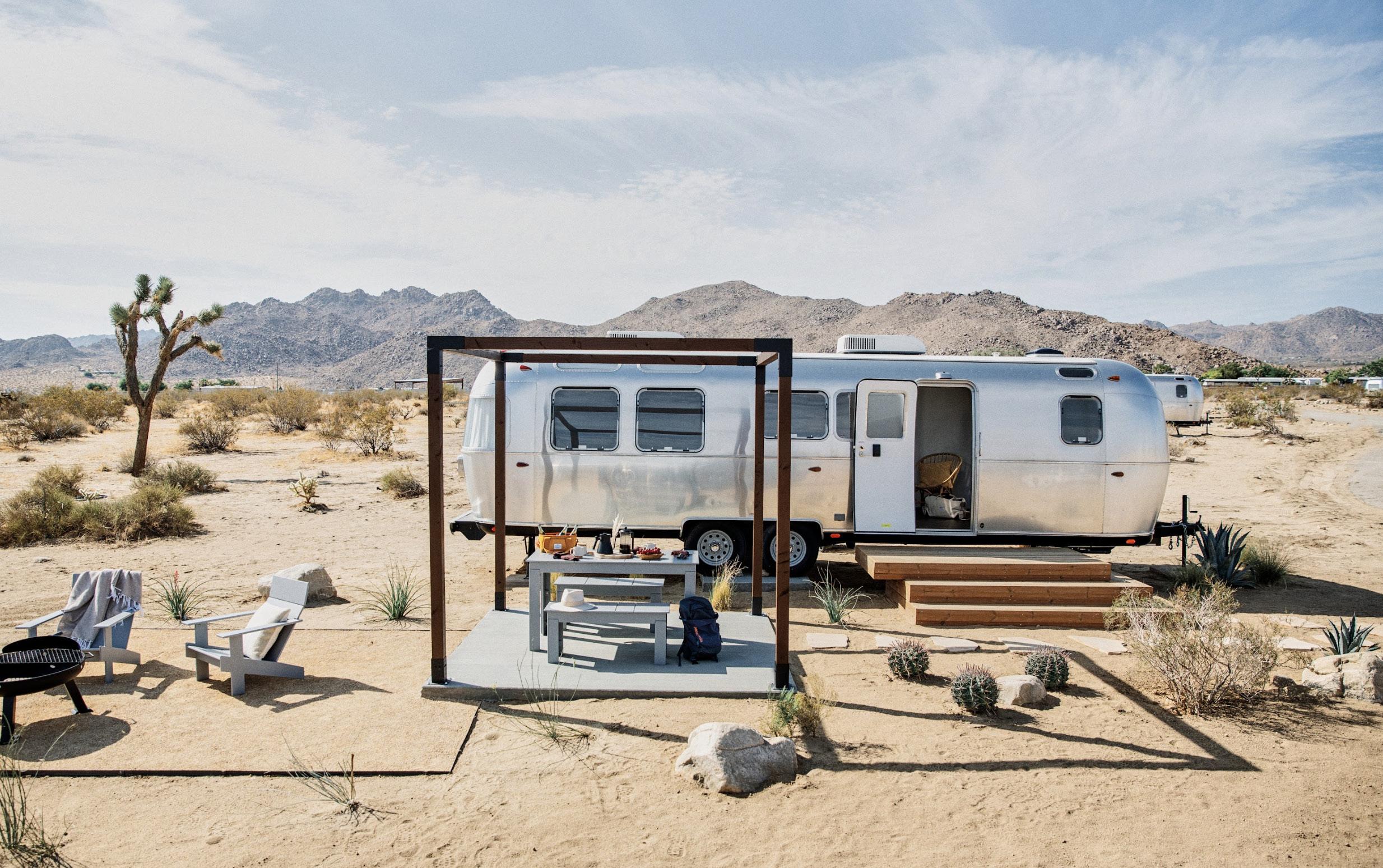
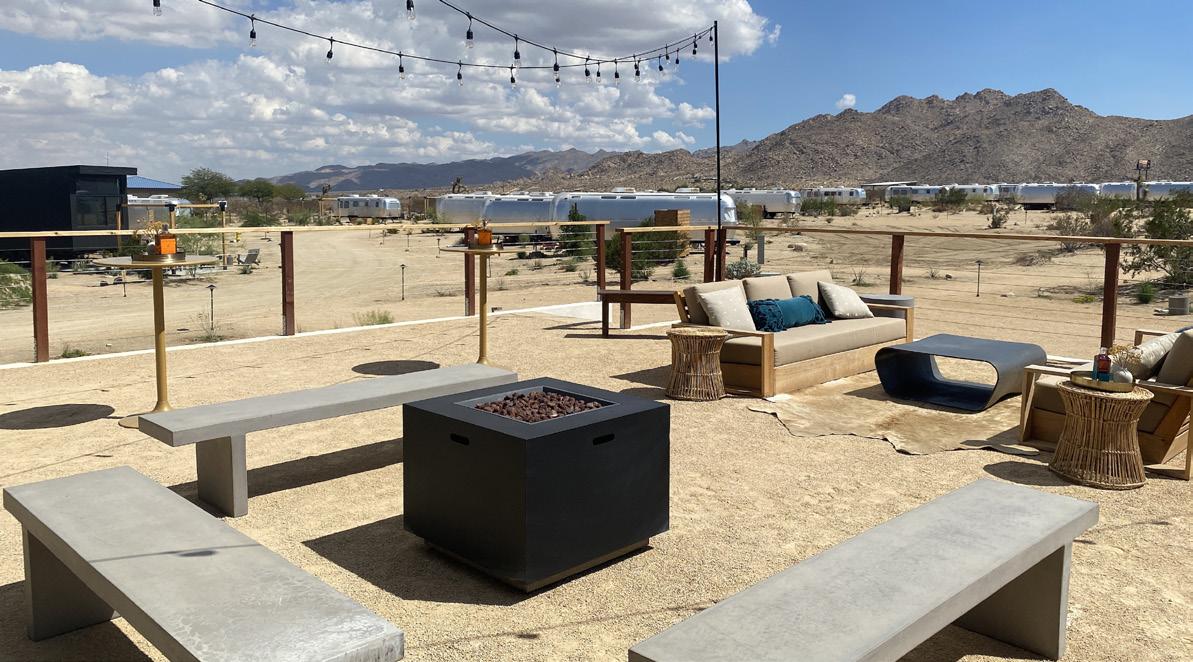
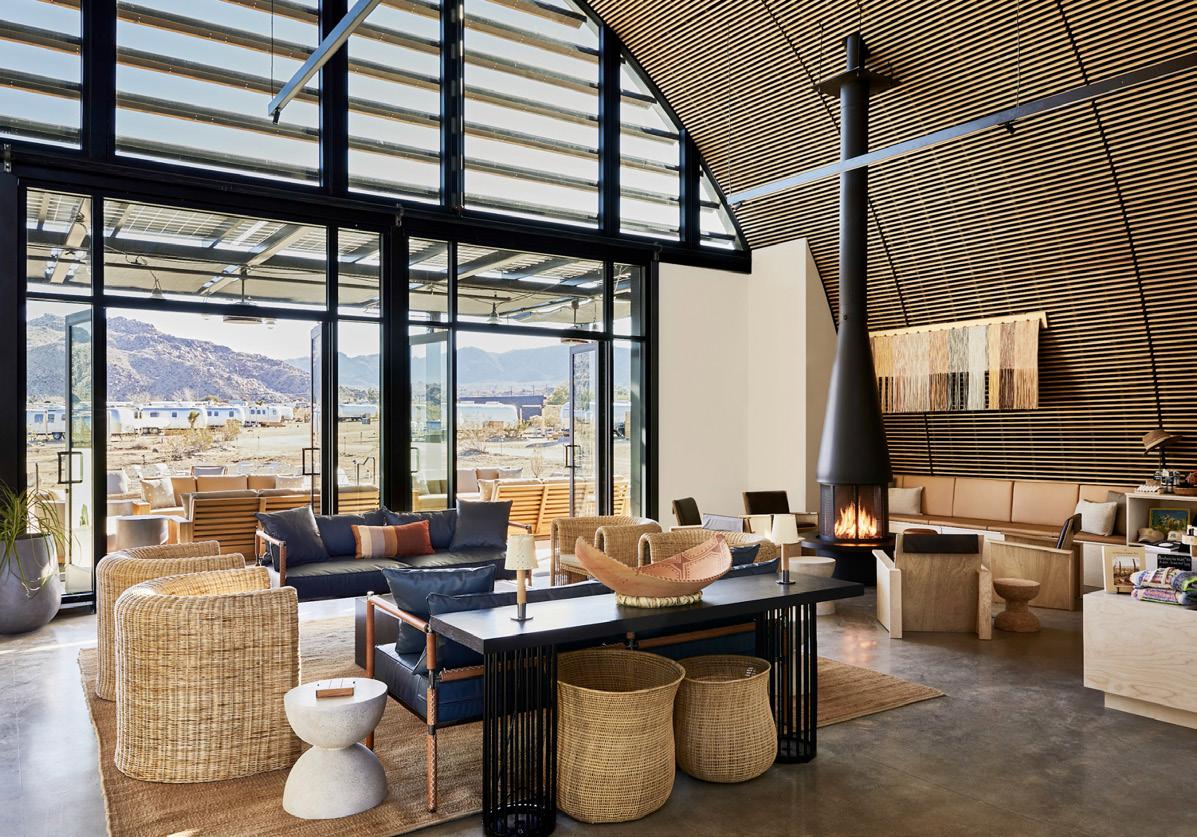
Other specialty activities at this base camp and nearby include a Sunset Wine Tasting with the Joshua Tree Bottle Shop, a Herbal Medicine Making & Desert Ecology Hike, Live Music Nights with local performers, half-day adventure hikes, and rock climbing excursions coordinated by AutoCamp and MojaveGuides at Joshua Tree National Park. Through the concierge, one can put together a customized expedition or sign up for the daily highlights expedition led by Bernard Leibov, Director of BoxoPROJECTS, who openly shares his insider’s view of the local culture.
If you’re planning a more ambitious road trip in California, AutoCamp has similarly equipped outposts in the Sequoia Forest, Yosemite National Park, and the Russian River Valley. There are also two East Coast locales in the Catskills (New York) and Cape Cod, with AutoCamp sites in Texas Hill Country, Utah’s Zion area, and Asheville, NC near the Blue Ridge Mountains set to open in 2023. Each AutoCamp is designed to reflect the natural geology and geography of each location.
AutoCamp Joshua Tree’s rates begin at $229/night for Airstream accommodations and $379 for the Vista X Suites. For more information about availability, resort events, and AutoCamp locations across the U.S., visit autocamp.com.
AutoCamp Joshua Tree 62209 Verbena Road Joshua Tree, CA (844) 366-9715









